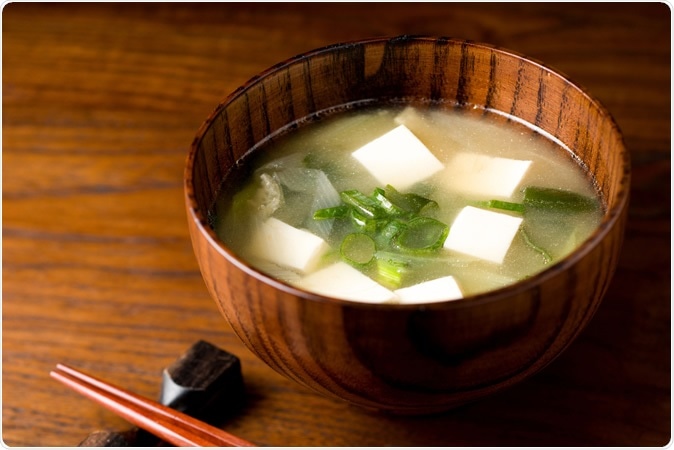A new study has shown that products made of fermented soy such as miso and soy sauce can help individuals live longer. The study titled, “Association of soy and fermented soy product intake with total and cause specific mortality: prospective cohort study,” was published in the latest issue of the journal British Medical Journal.

Miso soup. Image Credit: K321 / Shutterstock
The new study involved fifteen year dietary data of over 92,915 Japanese men and women aged between 45 and 74 years. There were 42,750 men and 50,165 women. The dietary habits as well as overall health of these individuals were taken into consideration before the results were analyzed.
The consumption of fermented soy products such as miso, natto were analyzed and on the other hand non-fermented soy products and tofu consumption were also analyzed with respect to mortality and overall health. Dietary data on 138 food and beverage items was gathered over five years from the participants and they were followed for an average of around 15 years. This was part of the Japan Public Health Centre-based Prospective Study which includes 11 public health centres across Japan.
The team looked at death certificates of the participants who died during the follow up period and noted the deaths due to cancers, heart or cardiovascular disease, cerebrovascular disease or stroke, respiratory diseases such as asthma and chronic obstructive pulmonary disease and injuries. They wrote that deaths were divided under five headings – “cancer, total cardiovascular disease mortality, heart disease, cerebrovascular disease, respiratory disease, and injury.” At the end of the follow up there were a total of 13,303 deaths. The participants also reported about their smoking and other habits in the five year survey. These were taken into consideration when assessing the association between fermented soy product use and mortality.
Results revealed that persons who ate more of the fermented soy products such as miso, soy sauce, tempeh, natto etc. were more likely to live longer. Miso is soy that is fermented with Aspergillus oryzae. Non fermented soy products include tofu or soy curd and abura-age or fried tofu. These foods are popularly consumed in many Asian nations and they have been found to lower the risk of death.
As a next step the team looked at the amount needed to be consumed to achieve the longevity benefits. Here the researchers noted that men who ate at least 50.2 grams of fermented soy products were 10 percent less at risk of dying within an average of 14.8 years. This was comparable with men who ate little fermented soy products. For women the benefits from soy products could be achieved by 46.6 grams of these fermented soy products each day, wrote the researchers. Natto is a traditional Japanese food where soy is fermented with Bacilus subtilis and it is a popular breakfast across the nation. This study looked at health benefits of natto alone and found that eating 26.2 grams of natto per day reduced the risk of deaths by 24 percent in men and 21 percent in women.
The researchers wrote that the possible explanation behind the benefits offered by these fermented soy products could be their high fibre content. They added that these foods also contain high amounts of potassium which could be beneficial in diet. Soy products, they wrote, are rich in “isoflavone and fibre” which have properties to prevent onset of cancers, heart disease, high cholesterol and weight gain, wrote the researchers. They explained that in fermented soy products whole soy breans are used. This prevents loss of essential nutrients which might be the case with non-fermented soy products. Further, fermentation of the soy beans also produces bioactive compounds such as polyamines and nattokinase (seen in natto), they wrote. They called for more studies to understand the exact reason why these foods could benefit by reducing mortality risks.
They warned that the reduction in mortality risk was not seen with “total soy product” consumption. This meant that fermented soy product consumption provide mortality benefits that were not seen with non fermented soy products. They wrote in conclusion, “A significant association between intake of total soy products and all cause mortality was not, however, observed. The findings should be interpreted with caution because the significant association of fermented soy products might be attenuated by unadjusted residual confounding.”
One of the authors of the study, Dr Norie Sawada of the National Cancer Centre in Japan, said that consuming fermented soy products is recommended to reduce the cardiovascular disease risk across the world.
Journal reference:
Association of soy and fermented soy product intake with total and cause specific mortality: prospective cohort study BMJ 2020; 368 doi: https://doi.org/10.1136/bmj.m34 (Published 29 January 2020) BMJ 2020;368:m34, https://www.bmj.com/content/368/bmj.m34